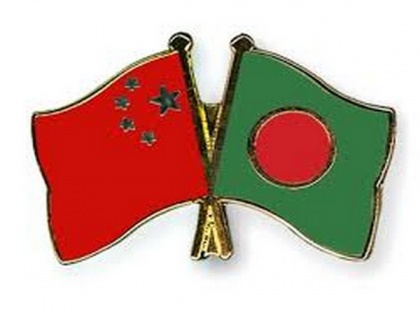China's latest warning to Bangladesh on joining Quad stems from losing political clout in Dhaka
By ANI | Published: May 24, 2021 11:21 PM2021-05-24T23:21:11+5:302021-05-24T23:30:03+5:30
China's warning of 'substantial damage' to bilateral ties with Bangladesh if the latter joined the Quad alliance emanates from a fear of Beijing losing another ally, which forms a critical part of the country's strategic focus on South Asia.

China's latest warning to Bangladesh on joining Quad stems from losing political clout in Dhaka
China's warning of 'substantial damage' to bilateral ties with Bangladesh if the latter joined the Quad alliance emanates from a fear of Beijing losing another ally, which forms a critical part of the country's strategic focus on South Asia.
Earlier this month, Beijing's envoy in Dhaka, Li Jiming, said the countries' relationship would suffer "substantial damage" if Bangladesh were to join the alliance alongside India, Japan, US and Australia.
China is increasingly concerned over the expansion of the grouping since officials from the US, India and Japan expressed an interest in including more "like-minded" democracies, such as Sri Lanka, South Korea and New Zealand, to counter China's growing power in the region.
Li Jiming's remarks come as an insight into China's concerns over the Quad's growing sphere of influence, writes Jagannath Panda for The National Interest.
Bangladesh forms a critical part of China's strategic focus on South Asia as Beijing and Dhaka share over forty-five years of diplomatic ties which have grown exponentially into a "long-term friendship." Dhaka's inclusion in the Chinese flagship project Belt and Road Initiative (BRI) has resulted in several projects.
Bangladesh has sought a geopolitical balance between India and China, driven by its national interests. However, Bangladesh's Foreign Minister AK Abdul Momen reacted sharply to China's comments on a "Bangladesh plus Quad", saying it has the right to decide its foreign policy.
Panda writes that China's premature remarks draw from its fears of losing its political clout in Dhaka, fueled by concerns of growing synergy in Bangladesh-India and Bangladesh-Japan ties.
Beijing is deeply unsettled of a 'Quad plus Bangladesh', which can challenge China's strategic outreach in South Asia and act as a catalyst for a new trend in the region by effectively enabling the Quad's expansion, he writes for The National Interest.
The inclusion of Bangladesh into the Quad would pose as a critical hurdle of China's BRI activities in the region, amid local authorities in Dhaka questioning the practicality and viability of BRI projects when the country is already hit hard economically.
Bangladesh is also well aware that Chinese aid and loans are designed to expand Beijing's influence and tilt the regional power balance, threatening India's position as Dhaka's leading partner.
Bangladesh's caution is evident in the halted Bangladesh-China-India-Myanmar (BCIM) economic corridor, which proposes to connect eastern/southern China to South Asia. The project has been repeatedly delayed and challenged and its future remains highly uncertain amid India-China tensions and the changing geo-economic environment in the region.
Meanwhile, a third country has entered the fray - Japan, as Bangladesh emerges as a major focus on New Delhi-Tokyo cooperation and the latter's Expanded Partnership for Quality Infrastructure (EPQI) is becoming one of the most important development partners of both South Asian and Southeast Asian states, writes Panda for The National Interest.
Japan's Foreign Ministry has termed Dhaka as the "intersection between India and ASEAN" and the country's investment in India's northeast can link the same to Bangladesh via projects like the Kaladan Multi-Modal Transport, Panda says.
In the case of Bangladesh joining the Quad, the BCIM project would no longer be viable as Dhaka would likely seek deeper developmental partnerships with partners like India and Japan. Chinese aid for Bangladesh also falls short of collective aid by other entities such as Japan, the Tokyo-led Asian Development Bank (ADB), and the International Development Association.
Panda writes for The National Interest that during the COVID-19 pandemic, Bangladesh has been witness to Chinese aggression and "wolf-warrior" style of diplomacy, and is more wary of Beijing's growing influence in its internal matters.
Moreover, the outreach of India and Japan is a point of concern for China, resulting in the Chinese envoy's latest expression towards Bangladesh.
The Quad is a strategic informal grouping of four democracies India, Australia, the US and Japan to counterbalance and check China's growing influence in the Indo-Pacific region.
Along with diplomatic engagements, Quad countries also engage in military and naval exercises, freedom of navigation, and rule-based order is the key principle of this informal grouping.
( With inputs from ANI )
Disclaimer: This post has been auto-published from an agency feed without any modifications to the text and has not been reviewed by an editor
Open in app